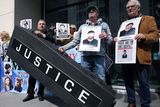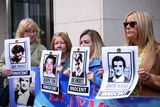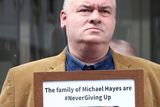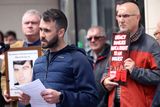‘We are not going away’: Troubles victims vow to keep pursuing justice during Legacy Act protest





The grandson of a GAA clubman shot dead after being abducted by the Loyalist Volunteer Force claimed “justice is dead” during a protest against the Legacy Act.
Damian Brown’s grandfather Sean Brown (61) was shot six times in the head near Randalstown, Co Antrim, in May 1997.
He had been driven more than 10 miles in a car from Bellaghy, Co Londonderry, after being captured while locking the gates of his beloved Bellaghy Wolfe Tones GAC.
Damian Brown, the grandson of Sean Brown who was murdered by loyalist paramilitaries in 1997, speaks at a protest against the Legacy Act in Belfast. Pic by Stephen Davison/Pacemaker.
“He made those club gates,” Mr Brown said.
“As well as dedicating his life to GAA, he was an educator in the technical college in Ballymena.
“He was found abandoned beside his own burned-out car, his body partially burnt by the intense heat.”
Mr Brown recalled how his grandmother insisted on having an open casket at the funeral “so everyone could see what the attackers did to her husband”.
Sinn Fein MP John Finucane says this is ‘a day of shame’ as a deadline for stopping legacy inquests comes into force.
— Brett Campbell (@WbeeCampbell) May 1, 2024
Troubles victims staged a protest outside the NIO in Belfast this afternoon. pic.twitter.com/FI50iTKaWZ
He criticised how no one has ever been charged with the brutal murder and slammed what he described as “a frightening litany of failings” in the original RUC probe.
The family received an apology from the PSNI in 2022 before it was revealed, during an inquest, that 25 people, including state agents, were linked to the killing.
Court proceedings were halted in March when a coroner said his ability to examine the murder had been compromised by the extent of confidential state material being excluded from the hearing on national security grounds.
The Government has since launched legal action over how the coroner dealt with a public interest immunity (PII) process in the case, while calls for a public inquiry have been ignored despite backing from former Police Ombudsman Baroness O’Loan.
“We invested our full faith in the inquest process,” Mr Brown told the rally in Belfast city centre.
“An inquest being the most fundamental, rudimentary, perfunctory of legal processes that the state must conclude when a life is taken in the manner in which Sean’s was stolen from him.
“Far from discharging its international obligations in law to convene and conclude Sean’s inquest, the British Government has instead abandoned its legal obligations.”
Mr Brown said his family will “no longer sit in dignified silence”, before warning that “when families do not have access to the courts, justice is dead”.
Read more
The Time For Truth demonstration took place outside the Northern Ireland Office (NIO) on the day new legacy arrangements shutting down some Troubles-era inquests came into force.
Sinn Fein MP John Finucane addressed victims and survivors outside Erskine House on what he described as a “day of shame”.
“This is a day when legal challenges in our courts officially come to an end,” he added.
“Challenges that have been taken by families who, on some occasions, have been waiting up to five decades for the simple right to ask their questions in a court room; for the very simple, basic, democratic right to have an inquest for their loved ones.”
Mr Finucane, whose father, Pat, was murdered by loyalists in 1989, said many inquests have not been able to conclude “because the British Government and their agencies knew that this day was coming”, which “incentivised” it to delay and frustrate the process.
Sinn Fein MP John Finucane speaks during a protest outside the NIO against the Government's new Legacy Act (Pic by Stephen Davison/Pacemaker)
The new Independent Commission for Reconciliation and Information Recovery (ICRIR) became operational on Wednesday.
The body was created by the Government’s Legacy Act, which received royal assent last year despite widespread opposition from political parties, victims’ organisations in NI, and the Irish Government.
The bill ensures that all new civil litigation and inquests into Troubles deaths which have not completed oral evidence will be stopped.
The ICRIR has stressed that legacy legislation will not end the prospect of prosecutions: section 25 of the Legacy Act explicitly gives the power to make a referral to the prosecuting authorities.
The Commission has a range of extensive police powers, including the ability to carry out investigations to support criminal prosecutions and to refer cases to the relevant prosecutor where there is evidence of a crime.
Briege Voyle was also among those taking part in the protest, alongside relatives of 10 people killed in the Ballymurphy massacre in August 1972.
Briege Voyle (left), whose mother, Joan Connolly, was killed in Ballymurphy, attended the protest against the Government's new Legacy Act (Pic by Stephen Davison/Pacemaker)
Following a decades-long fight to remove “an army smear” claiming that her mother, Joan Connolly, was an IRA gunwoman, Ms Voyle said she’s now “right back to the very start”.
“Our loved ones were found to be completely innocent. It was us who got to the truth and brought it into court during the inquest.
“But what about justice? Nobody has been held accountable for our loved ones being brutally murdered over a period of three days.”
Ms Voyle accused the Government of “having no interest in justice” as it seeks “only to protect its precious soldiers”.
Meanwhile, Kevin Campbell, whose uncle Michael Hayes (27) was shot nine times in the upper body and legs by a Royal Marine patrol near his home in Spamount Street on October 1, 1972, said he no longer believes justice is possible.
Kevin Campbell, whose uncle Michael Hayes was shot dead by soldiers, also took part in the protest against the Legacy Act. Pic by Stephen Davison/Pacemaker.
Soldiers claimed Mr Hayes, who was married with two young sons, was a gunman, but no residue was found on him to suggest he had been firing a weapon.
The killing was investigated by the Royal Military Police. However, the Director of Public Prosecutions recommended no further action to be taken.
“We have been looking for someone to be held accountable and to apologise, but we have been going in circles,” Mr Campbell said.
“The Legacy Act is a cruel and callous piece of legislation which pulls down the shutters and leaves our backs against the wall. But we are still here and we are not going away.”
Join the Belfast Telegraph WhatsApp channel
Stay up to date with some of Northern Ireland's biggest stories









